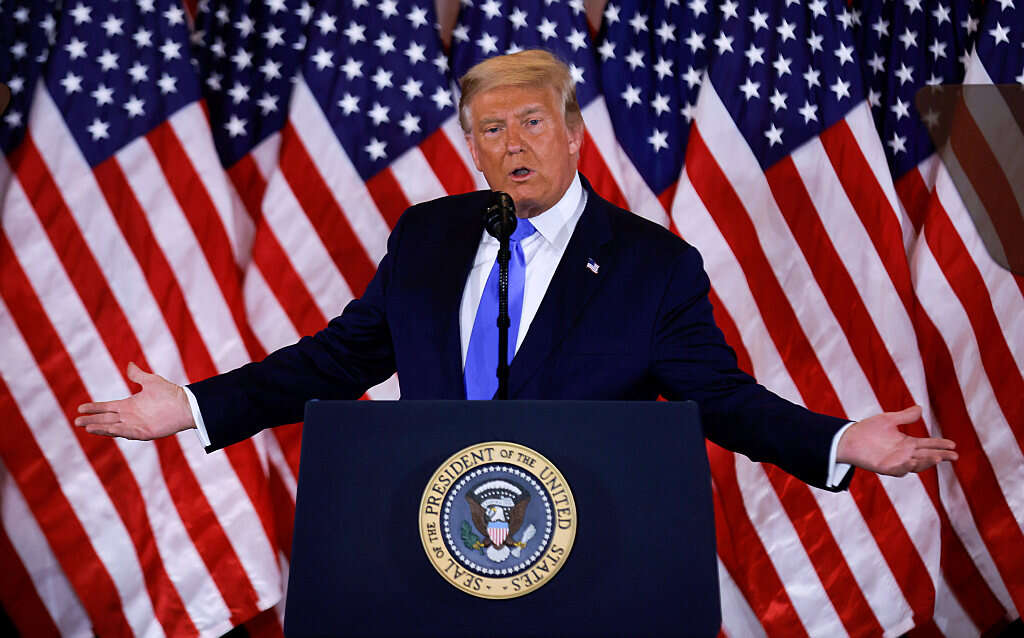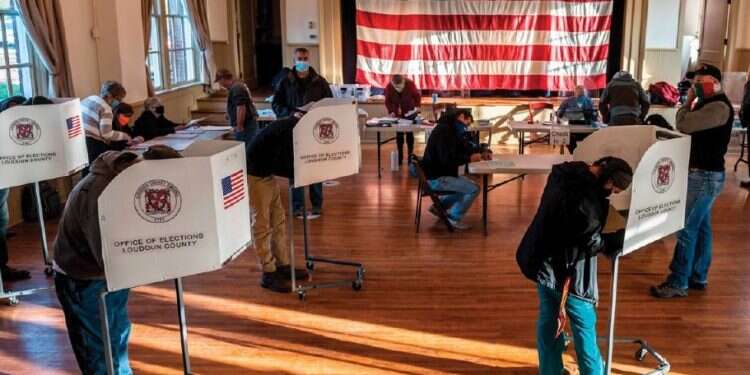A dramatic Election Day in the US: As of Tuesday morning (Israel time), it still wasn't clear who had won the presidential election, but it was already clear that voter turnout had amazed everyone and officials think that by the time all votes are counted, they will comprise the highest turnout in 100 years – with over 160 million people casting ballots.
None of the media networks was in a rush to declare the winner of purple swing states where neither party has a clear lead. At least at around 2:40 a.m., Biden had been declared the winner in Vermont and Virginia and a number of other predictable blue states, while Trump had been announced the winter in Indiana and Kentucky as well as in other predictable red states. Either way, in nationwide exit polls, voters said that the COVID crisis was more important than the economy, which could indicate an advantage for Biden nationally. The same can be said for most voters' support to keep former President Obama's health care reform in place. However, a national lead does not indicate a lead in electoral votes.
Follow Israel Hayom on Facebook and Twitter
All eyes are on Florida. According to pollster Nate Silver's site, Republicans voted in larger numbers than Democrats in Florida, but not as many as were expected.
Although I knew about and senses the tension in the air everywhere I visited in the US these past few days, it was still hard to see people in New York preparing themselves for riots over the election result.
When I got to town, after two days in the swing state Pennsylvania, which might decide the election, I hoped that blue New York wouldn't have the same tension. Because it was clear who would win New York State's 29 electoral votes: Joe Biden. But New York, as befits its stature, has been swept up in the election along with the rest of America from coast to coast, and from Hawaii to Alaska.
This election hasn't left a single American apathetic, because of COVID, but mainly because of the combination of COVID and Trump. As soon as I got to my hotel in New York, I felt like it was empty. At the reception desk, the clerk warned me it would be a difficult evening and gave me the telephone number of the hotel security guard so he could open the lobby door for me at night.
"We're expecting riots in the city," she explained, and for a moment I thought that I was in Iraq again, not the Big Apple, the beating heart of America and the western world.
For Trump, this election campaign has been a back-foot battle from the moment COVID erupted. It's doubtful he assessed the extent to which the pandemic would erase his inherent lead as an incumbent president. Because Americans almost never send the president home after only one term in office. Generally, that happens when unexpected events get out of control: like the major recession that caused George H.W. Bush to lose, or Jimmy Carter's helplessness in the hostage crisis at the US Embassy in Tehran. And of course, there was the Vietnam War, which caused Lyndon Johnson to leave.
But as of press time, despite the blows dealt by the COVID crisis, Trump is doing just the opposite of an alarmist campaign: he continued to campaign up to the very last minute, and said on Fox News that the situation was "excellent." As someone who was out in the field in a number of key states in the past few days – from Lititz, Pennsylvania in the east and to Nevada and Arizona in the west and Florida in the south – it's very possible that Trump wasn't wrong. Because if there's one thing that COVID didn't change, it's his connection to his base, a connection that Biden would do everything to duplicate on the left side of the map.
'Electric City'
The question is whether he will manage to reproduce the miracle from four years ago when he won thanks to a few tens of thousands of loyal supporters from that base, who made the difference. In effect, if four years ago we were asking if Trump would manage to break through the Blue Wall in the Midwest, this year we've been asking if the Democrats will be able to rebuild it. According to the polls as of Tuesday morning, it appeared as if they managed to repair the wall in Wisconsin and Michigan, but not in Pennsylvania. Which is why Pennsylvania is so critical. Because in so many models it is the difference between a victory and a loss for Trump.
Until the last minute, Biden was hoping to brand himself as a local in Pennsylvania because he grew up in Scranton until he was nine, and on Tuesday even went back to his childhood home as a symbolic act. I was in Scranton on Monday to attend a Trump rally at the local airport.

The town is known as Electric City, but it seems as if the only electricity running through the streets is the energy that Trump is bringing. I also noticed a lot more Trump signs. The city of miners and railway workers felt more comfortable with Trump, the New Yorker, than with the former Pennsylvanian Biden. It's a poor city, a workers' city, and you can almost smell the rust in the air, like in other parts of Pennsylvania I've visited in the past few days. Pennsylvania, like many people say, is three states: the industrial west, the conservative middle, and the liberal east. Trump managed to unite all three parts in 2016, by a tiny margin, and the question is whether he will do it again.
One possible scenario is Biden and Trump each winning 259 electoral votes, and Pennsylvania deciding the winner. Or Trump wins Pennsylvania but the Democrats flip three states for a tie. Either way, the big question is how many independent voters there were as of Tuesday, and whether or not a lot of them answered "Biden" in polls but at the last minute voted Trump. We still don't have a decision, but the tension in the air and the concern about violence are likely to remain.
I never thought I would have to experience a night in a barricaded, frightened New York. The 2020 election might be over 270 electoral votes, but it's mostly about how to handle the perfect storm that it's unlikely we'll see again: an election in the shadow of a pandemic along with a referendum on the least predictable, and least understood, president there has ever been.
'Gathering for victory'
Even before Election Day officially began, over 100 million Americans had cast ballots in early voting. The turnout in early voting in the days leading up to the election was no less than historic. According to most tallies, the number of Americans who had voted by Election Day stood at some 100 million, or 72% of the total voters in the 2016 election.
Trump ended his campaign events only early Tuesday morning in a blitz across a few states. On the day itself, the president opted to stay near the White House and the Republican Party headquarters in Arlington, Virginia. First Lady Melania Trump arrived in Florida to vote. In an early morning telephone interview with Fox News, President Trump claimed he had a very "solid chance of winning." Despite reports that he intended to declare victory before all the votes were counted, including mail-in votes, the president said he would declare victory "when there's victory if there's victory. I think we'll have victory."
"I think the polls are suppression polls. I think we'll have victory, but only when there's victory. There's no reason to play games," he said.
Subscribe to Israel Hayom's daily newsletter and never miss our top stories!
Like the entire election itself, the last 24 hours for former Vice President Joe Biden were very different than for his opponent. The Democratic candidate spent Monday and Tuesday in Pennsylvania. "It's good to be home," the Democratic nominee said, accompanied by two of his grandchildren. On the wall of the living room, he wrote: "From this house to the White House with the grace of God."
"I have a feeling we're in for a big win tomorrow. we can put an end to a presidency that has left hard-working Americans out in the cold. Tomorrow we can put an end to a presidency that has fanned the flames of hatred. Tomorrow we can put at end to a presidency that has failed to protect this nation," Biden said.
Biden was expected to return home to Delaware. Trump, meanwhile, planned to hold a vote-counting party at the White House.
Yoni Hersch in new York contributed to this report.




